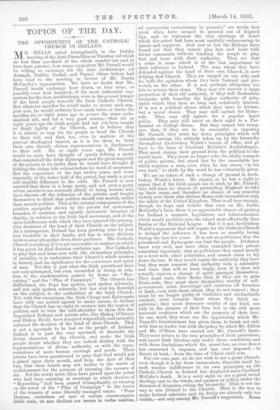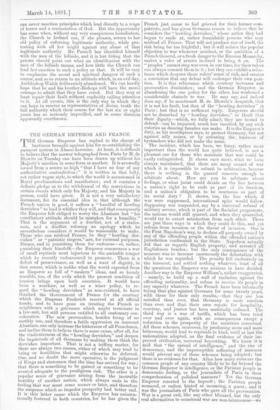TOPICS OF THE DAY.
THE OPPORTUNITY OF THE CATHOLIC CHURCH IN IRELAND.
MR. HEALY asked triumphantly in the Dublin meeting of the Anti-Parnellites on Tuesday (of which no less than one-third of the whole number are said to have been priests), how many supporters Mr. Parnell would be willing to exchange for the four Archbishops (of Armagh, Dublin, Cashel, and Tuam) whose letters had been read to the meeting in favour of Mr. Justin McCarthy's organisation. We have no doubt that Mr. Parnell would exchange four dozen, or four score, or possibly even four hundred, of his most influential sup- porters for the four Archbishops, even in the present temper of the Irish people towards the Irish Catholic Church. But whatever sacrifice he would make to secure such sup- port now, he would certainly have made twice or thrice the sacrifice six or eight years ago to secure the same eccle- siastical aid, and for a very good reason,—that six or eight years ago the Irish people had not yet been taught to think lightly of the Church, and to believe that it is almost as easy for the people to bend the Church to their will, and that, too, even in matters of the gravest theological import, as it is for them to bend their own directly chosen representatives in Parliament to their will. Six or eight years ago, Mr. Parnell would no more have thought of openly defying a, party that counted all the Irish Episcopate and the great majority of the priests in its ranks, than he would have thought of bidding the rising tide retreat before his word of command. But the experience of the last twelve years, and more especially of the latter half of the period, has made a great and sensible difference in the odds. Mr. Parnell is now assured that there is a large party, and not even a party whose members are seriously afraid of being known, who have thrown off the influence of the priests, and taught themselves to think that politics should rule morale, rather than morals politics. This is the natural consequence of the positive sympathy shown by the priests for systematic breaches of contract, and equally systematic breaches of charity, in relation to the Irish land movement, and of the open indifference with which they have ignored the peremp- tory decisions of the head of their Church on the subject. As a consequence, Ireland has been growing year by year less tractable in their hands, and has in many districts broken away altogether from their guidance. The Catholic Church is nothing if it is not inexorable on matters on which it has given its final decision centuries ago. For Catholics to play fast and loose now with the elementary principles of morality, is to undermine their Church's whole mission in history, and its significance for the conscience and spirit of man. Yet this is just what the Irish priesthood have not only attempted, but even succeeded in doing, in rela- tion to the condemnation passed by Rome on " Boy- cotting " and the " Plan of Campaign." The Church has deliberated, the Pope has spoken, and spoken solemnly, and not only spoken solemnly, but has sent his Rescript on the subject, to the authorities of the Irish Church. Yet, with few exceptions, the Irish Clergy and Episcopate have with one accord agreed to make excuse, to declare that the Church has no right to venture into the region of politics, and to turn the cold-shoulder to those few dis- tinguished Bishops and priests who, like Bishop O'Dwyer and Bishop Healy, have accepted respectfully and earnestly enforced the decision of the head of their Church. That is not a spectacle to be lost on the people of Ireland. Indeed, it is just the very spectacle to discredit the divine character of the Church, and make the Irish people doubt whether they are indeed dealing with the representatives of divine authority, or with the repre- sentatives of mere human cravings and needs. Their priests have been accustomed to pray that God would put a guard upon their mouth, and keep the door of their lips, that their hearts may not incline to the words of maliciousness for the purpose of excusing the excuses of sin. Yet the words must often have jarred upon the priest who had been assisting at meetings in which decrees of " Boycotting" had been passed triumphantly, or turning on the screw of the " Plan of Campaign " to the terror of the tenants of some liberally managed estate. " Pone Domine, custodiam on meo et ostium circumstantins labile meis, ut non deelinet cor meum in verbs, malitice, ad excusandas excusationes in peccatis," are words that must often have seemed to proceed out of feigned lips, and to represent the very stirrings of heart which the priest had been most carefully endeavouring to ignore and suppress. And now at last the Bishops have found out that they cannot play fast and loose with divine commands without teaching the people to play fast and loose with their authority. They see that a crisis is come which is of the last importance to their influence in Ireland. The man whom they have defended against the head of their own Church, is now defying that Church. They are ranged on one side, and he, with the agitators whom they have fostered and pro- tected, on the other. It is not, perhaps, altogether too- late to retrace their steps. They may yet recover a large proportion of their old authority, if they will themselves recognise with humility the higher authority of prin- ciples which they have so long and sedulously ignored. It is not a political choice which they have to reverse, but a moral choice. They may still agitate for Home-. rule. They may still agitate for a popular Land policy. They may still insist on their right to a Par- liament on College Green. But they cannot but recog- nise that, if they are to be successful in opposing Mr. Parnell, they must lay down principles which will virtually arraign the attitude taken up by the hierarchy throughout Archbishop Walsh's tenure of office, and go. back to the lines of Cardinal McCabe's Archbishopric. They must change their ground from the political to the moral basis, They must no longer echo the shifty counsels of politic priests, but stand fast by the immutable law which requires a man, even when he has sworn " to his own hurt," to abide by the word he has voluntarily given.
We see no token of such a change of ground in Arch- bishop Walsh's letter. He argues, as he has a right to argue, that if the Irish people are to stick by Mr. Parnell, they will have no chance of persuading England to take up their cause, and therefore no chance of any peaceful victory over those who declare Home-rule inconsistent with the safety of the United Kingdom. That is all true enough, though we hope and believe that even on Mr. Justin McCarthy's lines, there is no appreciable chance of gaining. for Ireland a separate Legislature and Administration which would probably ruin the island more effectually than famine or the National League. But it is not Archbishop Walsh's argument that will regain for the Catholic Church in Ireland the influence it has been so steadily losing during the last few years. It is not as politicians that the priesthood and Episcopate can lead the people. Irishmen know very well, and have often reminded their priests somewhat vigorously, that as politicians they stand merely on a level with other politicians, and cannot claim to lay down the law. If they would regain the authority they have lost, they must reassert that authority with a solemnity and force that will at least imply, even if it does not actually express, a change of spirit amongst themselves. They must warn their flocks that, if they are to gain Home-rule, they must show themselves worthy of self- government, must discourage and condemn all breaches of faith, even with those whom they do not respect ; they must be no longer guilty of vindictive and uncharitable conduct, even towards those whom they think un- patriotic; they must denounce cruelty of any kind, not only to the persons of their foes, but to the still more innocent creatures which are the property of their foes. In one word, they must use the opportunity which Mr. Parnell's licentiousness has given them, to break not only with him as leader, but with the policy by which Mr. Dillon and Mr. O'Brien have carried out Mr. Parnell's hints. They must return to the true principles of Irish patriotism, and assert Irish liberties only under those conditions and with those limitations which the moral law, as even Ron; e has construed it, imposes, and has ever imposed,—in theory at least,---from the time of Christ until now. For our own part, we do not wish to see a, great Church, even though it is far from immaculate, discredit itself by such wanton indifference to its own principles as the Catholic Church in Ireland has displayed since Cardinal McCabe's death. It is a sorry sight to see a great moral theology cast to the winds, and passion or policy, under the thinnest of disguises, ruling the hierarchy. That is not the way to win Ireland to the Church. That is the way to make Ireland atheistic, and its fruits are already only too visible,—not only among Mr. Parnell's supporters. Rome can never sanction principles which lead directly to a reign of terror and a renunciation of God. But the opportunity has come when, without any very conspicuous humiliation, the Church in Ireland can, if she pleases, return to her old policy of enforcing legitimate authority, while pro- testing with all her might against any abuse of that legitimate authority. Mr. Parnell has identified himself with the men of the hillside, and it is but fitting that the priests should point out what an identification with the men of the hillside means, and how little the Church can lend her sanction to such a policy as that. It will be easy to emphasise the moral and spiritual dangers of such a course, and so to return to an attitude which, in an evil day, Archbishop Walsh deliberately abandoned. We can hardly hope that he and his brother-Bishops will have the moral courage to admit that they have erred. But they may at least repair their fault without explicitly calling attention to it. At all events, this is the only way in which they can hope to recover as representatives of divine truth the full authority which their course for the last six or eight years has so seriously imperilled, and in some districts apparently overthrown.



































 Previous page
Previous page